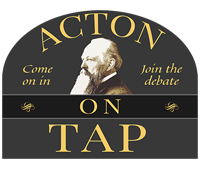March 12, 2014
March 11, 2014
A Chicago Chicken Shop’s Statement of Faith
February 28, 2014
How the Media Mislead the Public About Arizona’s Religious Freedom Amendment
February 17, 2014
George Washington: Champion of Religious Liberty
February 14, 2014
Gov. Jindal: The Silent War on Religious Liberty
February 10, 2014
When Did The United Nations Become A Theology School?
January 31, 2014
Explainer: The Hobby Lobby Amicus Briefs
January 31, 2014
‘Little Victims Of The State:’ Steam-Rolling Religious Liberty In America
January 30, 2014
Acton on Tap: The Growing Threat to Religious Liberty
David Urban, an English professor at Calvin College, recently interviewed the managing editor of Religion & Liberty, Ray Nothstine about the upcoming Acton On Tap Event: The Growing Threat to Religious Liberty. Continue Reading...
January 29, 2014
